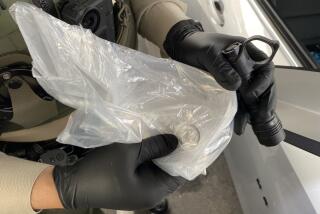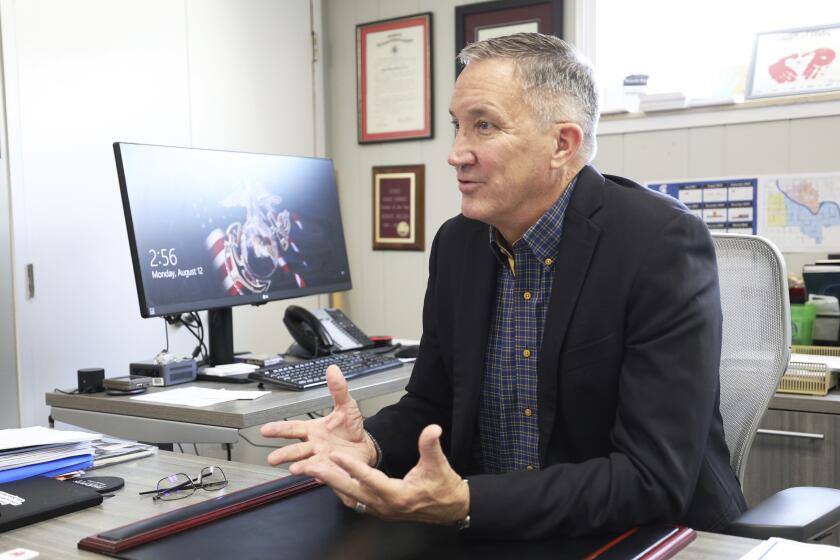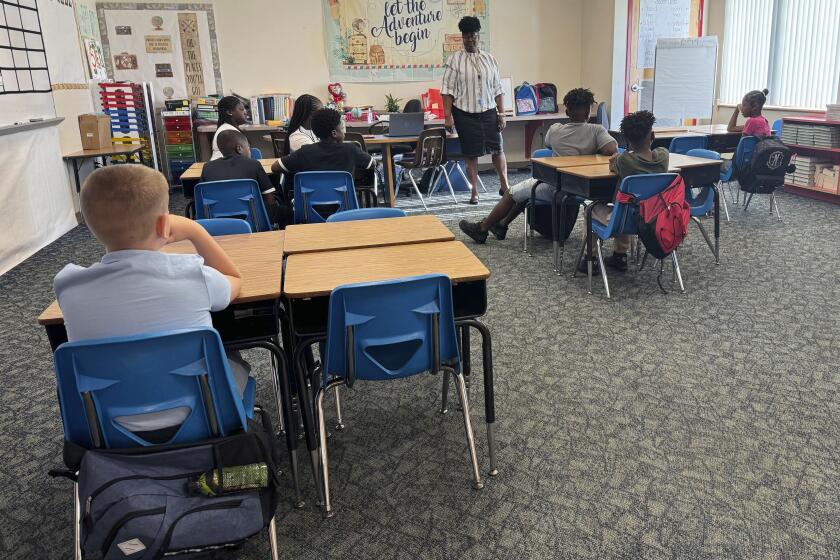Teen Mothers See a Future in Degrees
In some ways, Bernice Mendivil has it made.
She’s about to get her high school diploma and plans to study photography at Ventura College. She has a boyfriend. She has a full-time job at a clothing store.
Bernice Mendivil, 18, also has a son, Matthew, 9 months.
“I love my son, he’s my No. 1 priority,” Mendivil said last week before her parenting class at Gateway School. “But if I could go back and do it over again, I would not get pregnant.
“I feel like I’m going on 25 or 26 instead of 19.”
Mendivil is one of hundreds of Ventura County teen-agers observing Mother’s Day as mothers. In 1988, according to the most recent figures available, 356 Ventura County girls 17 or younger gave birth. Another 327 babies were born to 18-year-olds.
“I figured it was the end of the world, my life was over,” Mendivil said, recalling the day she learned she was pregnant. “I thought I’d be a typical teen-age mother.”
Typical, according to people who work with teen-age parents, means that the father takes no responsibility for the child. Matthew’s father, for example, still hasn’t seen him, Mendivil said.
Even when the father is involved, “it can range from an occasional visit to marriage,” said Nikki Steele, who runs the county’s Pregnant/Parenting Adolescent Program, which has three counselors helping 106 pregnant and parenting teen-agers.
Nor can a pregnant teen-ager count on her parents to help.
“With a teen-age mother, grandma is often young and working herself,” said Christine Smith, director of student services for the Oxnard Union High School District, which has about 50 pregnant or parenting students.
So it’s no wonder that a large number of teen-age parents never finish high school. About 120 students are enrolled in the county’s three major high school programs for pregnant or parenting students, barely one-third of the estimated number of girls 17 and younger who give birth each year.
Those who stay in school say it’s part of being a parent. “I needed to have an education for my child,” said Martha Cruz, 18, of Camarillo, who attends Gateway with 18-month-old Melissa in tow. “I wanted at least a diploma.”
Gateway has the county’s largest program for teen-age mothers. Housed in former Air Force buildings at the Camarillo Airport, the 10-year-old school has 350 students, including pregnant and parenting teen-agers, students with attendance or discipline problems and dropouts returning to school after long absences. Its $1.2-million annual budget comes from the county superintendent of schools’ office.
Much like special schools operated by Oxnard Union and the Simi Valley Unified School District, Gateway provides individual instruction, transportation, day-care and--perhaps most important for its 62 pregnant or parenting students--practical training in motherhood.
Mendivil attends Gateway only one day a week, fitting her studies around her work schedule the rest of the time.
Wednesday is her school day, but there are no dances or pep rallies in her high school routine:
* Up by 7 a.m. to get herself and Matthew ready.
* Off by 9 to Gateway, where it takes about 20 minutes to get Matthew signed in and settled down at the school’s day-care center.
* At a desk for two hours, going over lessons with her primary teacher, Nanette Melero.
* In parenting class by 11:30.
At last week’s class, half a dozen teen-age mothers were taking turns holding a 3-month-old girl named Ieasha.
“Pass me the diaper bag, please,” said Rachel Estrada, 18, sensing that Ieasha was hungry. Indeed, the wide-eyed little girl, wearing two white bows and a pink dress trimmed with lace, eagerly sucked on a bottle. Estrada tended to Ieasha while the baby’s guardian, instructor Christine Blount, led the discussion.
The topic was discipline.
“Think back to the ways your parents raised you,” Blount said. “What were some of the positive ways?”
No one spoke.
“How about the bad ways?” Blount continued.
“No parties,” one girl said, to a murmur of agreement from some of the others. “If I was bad, they didn’t let me go.”
More recollections came out. Mendivil offered an example of what she thought was bad discipline: “When they said no and didn’t stick with it.”
Later, the discussion alternated between theoretical and practical aspects of keeping kids in line, including such topics as spanking (“It just made me rebellious,” Blount said); child abuse (more than 1 million cases a year in the United States, according to a class handout); keeping toddlers entertained (“Turn up the color on the TV,” Blount suggested); and dealing with tantrums (“Ignore them”).
“Anybody can be a parent,” said Blount, who has three children and two foster children and is looking after Ieasha while the baby’s mother is incarcerated. “It’s not easy to be a good parent.”
While the teen-age mothers are in class, their babies are playing, eating, crying or--if they don’t mind the racket--sleeping in a small hangar-shaped building crammed with playpens, swings, stuffed animals and other toys.
Gateway offers free day care three days a week. “We do it to keep them in school,” said Kathy Auth, who runs the center. “It’s tough on these girls,” she continued, bouncing a brown-skinned boy named Amador in her arms. “They have to meet needs as a wife and mother and still go home and do algebra and history.”
She said she doesn’t think programs such as the one at Gateway encourage teen-agers to have babies by making it easier.
“They’re having kids whether we have this or not,” she said. “If they’re having kids, it’s too late for moral judgments.”
Most of the young mothers at Gateway said they had not planned to get pregnant.
Adella Morales did.
“I wanted to have a baby,” said Morales, 16, who lives with her family in Santa Paula. “I like taking care of kids.”
So at age 14, when her two little brothers stopped needing her so much, she became pregnant with Amanda, now almost a year old. Adella is engaged to Amanda’s father and plans to marry him when she turns 18.
“Teen-agers have babies for the same reasons adults do,” said Lynn Coleman, who runs the pregnant and parenting program at Gateway. The reasons, she said, include getting or maintaining a relationship, having someone to take care of and “having someone to love you.”
“Our culture sells motherhood,” Coleman said. “It glamorizes it.”
Unlike most teen-age mothers, Irene Alvarez of Simi Valley was married when she became pregnant. By the time Anthony was born, however, Alvarez was an 18-year-old divorcee and a ninth-grade dropout.
Next month, she’ll get her high school diploma from Gateway.
Coleman and Gateway instructor Kate Nasse say Alvarez, now 20, has made remarkable progress in her nearly three years there.
Like many other Gateway students, Alvarez takes classes through the adjacent Regional Occupational Program, where she is learning to be a dental assistant. She is doing internships at dental offices in Simi Valley and Thousand Oaks while attending classes two days and one evening a week. On Saturday and Sunday she pulls eight-hour shifts as a service-station cashier in Simi Valley.
The dentist in Thousand Oaks has offered her a job when she graduates, but eventually Alvarez hopes to enter the two-year nursing program at Moorpark College. She said she is grateful to her mother for taking care of Anthony when she cannot.
“Is this glamorous?” Alvarez said. “Not at all. You work twice as hard to get an education. Without an education, you can’t get anywhere.
“I don’t get to go out. Maybe every two months I go out with friends. You have no social life if you’re doing what I’m doing.”
She acknowledged that she is doing more than a lot of teen-age mothers. “I know girls who think it’s too much work to get a job or go to school,” Alvarez said. “They’d rather live on welfare.”
The walls of the cubicle where she sat were covered with charts, announcements, a map of the world, and posters, some with inspirational sayings.
One of them said: “It’s not what happens to us that counts. It’s our reaction to it.”
More to Read
Sign up for Essential California
The most important California stories and recommendations in your inbox every morning.
You may occasionally receive promotional content from the Los Angeles Times.






